The HyperTexts
Arab Spring Poetry: Poems of the Arab Awakening
compiled by Michael R. Burch,
an editor and publisher of Holocaust and Nakba poetry
These are poems of the "Arab Spring" or "Arab Awakening."
Here you will find poems by Mahmoud Darwish, Walid
Khazindar, Khaled Nusseibeh, Iqbal Tamimi, Fadwa Tuqan, Nahida Izzat and other poets who cry out with one voice, "We too are human beings
who deserve and demand rights equal to those of Israeli Jews and American Christians! When will the free world recognize our right to life,
liberty and the pursuit of happiness?"
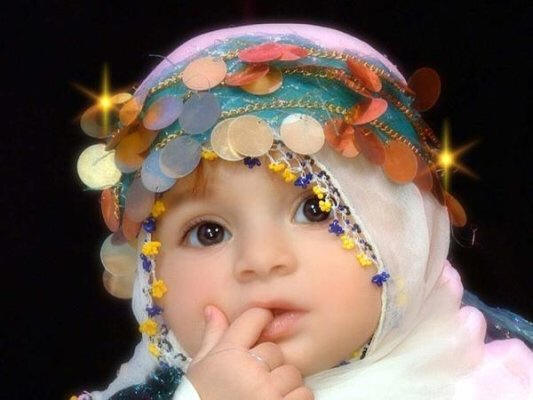
Epitaph for a Palestinian Child
by Michael R. Burch
I lived as best I could, and then I died.
Be careful where you step: the grave is wide.
Epitaph for a Palestinian Child
by Michael R. Burch
translated by
Iqbal Tamimi
مرثية لطفل فلسطيني
عشت قدر استطاعتي، وبعدها متّ
إحذر أين تخطّـو: فالقبر واسع
"Stripped of our raiment, are we not all the same flesh, the same blood?" As
I sat down to work on this page, these words occurred to me, but when I tried to
locate their source online, I couldn't, so it seems they must have have originated from
within me. Still, they seem like good words to begin a dialogue with. If
beauty is only skin deep, our genetic differences seem to be equally
shallow. Perhaps our differences begin and end with clothes, lipstick
and culture. The beautiful Palestinian girl above would be no less beautiful,
and no less human, if she was wearing a Cherokee headdress. And
she certainly doesn't strike me as being a "terrorist," or likely to grow up to
be one.
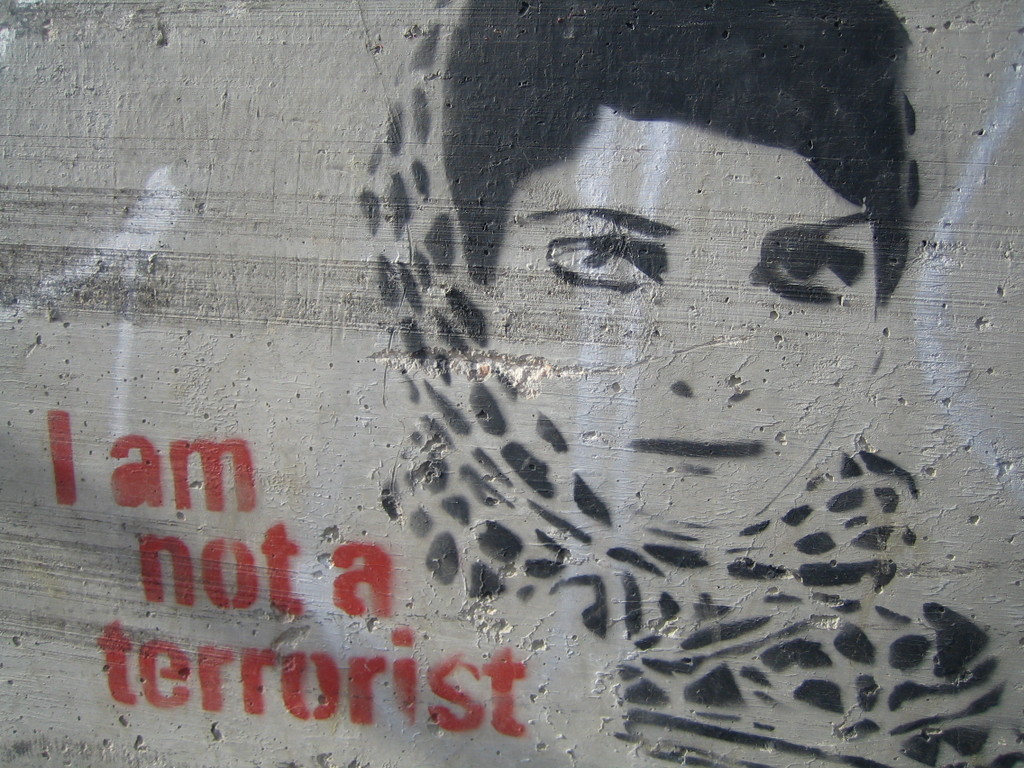
And so, as the world seems to teeter on the brink of World War III, I find myself asking, "Why?" All the
Arabs I have met personally seem very much like people I want to know, and am glad to know. (For
instance, the determined-looking young man below, wearing a Jerusalem tee-shirt
and carrying an American flag. I met him at a Palestinian Freedom Walk in Nashville,
Tennessee.) Why
then, so much fear, anger and distrust?
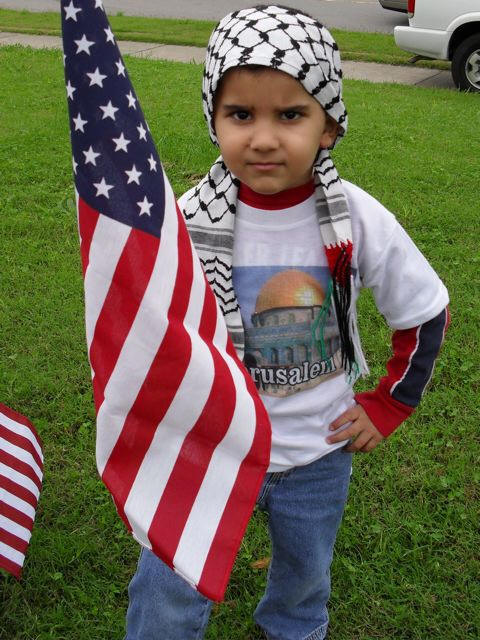
After much study and reflection, I have come to the conclusion that
it is Western interference in the Middle East, particularly in Palestine, that
has created much of the fear, anger and distrust. I'm not sure if most people
on either side actually "hate" each other. I hope not. I certainly find it
impossible to "hate" the people whose pictures appear on this page. I met the
girls below at the same Freedom Walk.
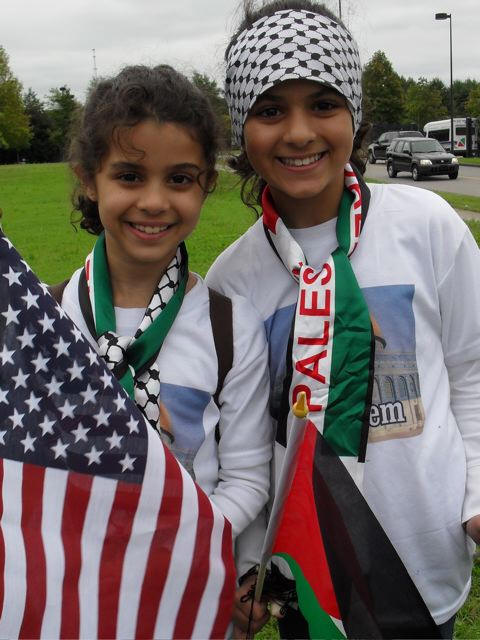
The young man below just might be the cutest walker of them all! I hope I've
made my point. Racial hatred is absurd. If we hate people because they look or
dress differently than we do, the problem lies with us, not them. But I don't
believe most Americans "hate" Palestinians. Americans have increasingly been
putting racism in the prehistoric past, where it belongs. So what is the
problem, exactly?
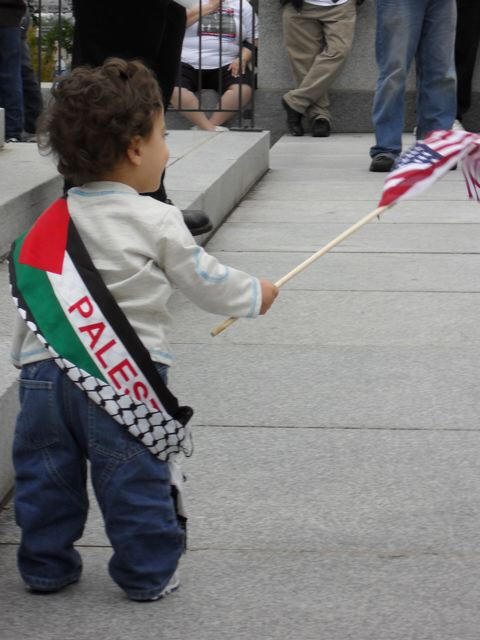
I find the story and words of Mahmoud Darwish, perhaps the most acclaimed of the
Palestinians poets whose words appear on this page, illuminating.
Mahmoud
Darwish was born in the
Galilean village of Barweh, which was razed to the ground
by Israelis during the Nakba ("Catastrophe") in 1948, when
Darwish was seven. Like hundreds
of thousands of other Palestinians, Darwish became an exile, along with his
family, because his ancestral village had been destroyed. The title of his
first book, Wingless Sparrows, speaks volumes. And yet Darwish rejected anti-Semitism,
saying:
The accusation is that I hate Jews.
It's not comfortable that they show me
as a devil
and an enemy of Israel.
I am not a lover of Israel, of course.
I have
no reason to be.
But I don't hate Jews.
As a young man, Darwish faced house
arrest and imprisonment because of his political activism. He left Palestine in 1971, to
attend college briefly, after which he worked for a newspaper in Cairo,
then in
Beirut as an editor of Palestinian Issues. When he joined the PLO in
1973, he was banned from reentering Palestine. Still, he recognized the humanity
of the Jews; some were his oppressors, other his lovers:
I will continue to humanise even the enemy . . .
The first teacher who
taught me Hebrew was a Jew.
The first love affair in my life was with a Jewish
girl.
The first judge who sent me to prison was a Jewish woman.
So from the
beginning, I didn't see Jews as devils or angels
but as human beings.
Several of his poems were written for Jewish lovers. He said: "These poems take the side of love, not war."
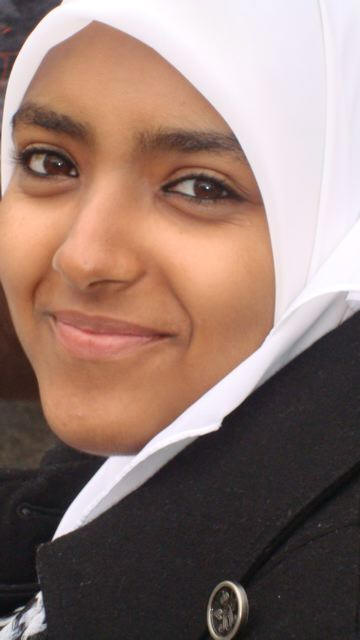
But even if hatred is not the main problem, the
consequences of mutual fear and distrust have been disastrous for the world:
Our distance is frightening:
a distance like the gap between thunderhead and earth
interrupted by bizarre and terrible lightning.
I believe my small poem above may catch something of how many Palestinians must feel about
Americans (although most Americans seem to believe the lightning originated in the
opposite
direction). Each side seems to feel threatened, if not doomed, by the other. But these
lines by Khaled Nusseibeh strike me as important:
The oppressed can but pursue suitable tracks
Learning to heed the lessons of awesome war
But will the mighty listen to reason’s voice
That justice will accomplish the peace of Rome?
Or will conscience’s dictates be inexorably ignored
As war’s clouds hover over culture’s great cradle?
And yet we do not harbor the odium of hatred
But pray that peace can still be humanity’s finest hour
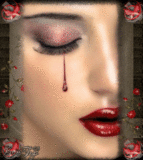
The famous Pax Romana was very precarious, often
bloody, and was not the result of justice, but of the tyranny of military power. The only
lasting peace is a just peace, because injustice invariably leads to violence
on both sides. So when will the mighty listen to reason's voice, and help
establish a just peace? Hopefully beginning now, as we explore the possibility that the Western
world has misjudged and terribly mistreated the Palestinian people. If so,
then perhaps we can begin to
see the inviting form of a just peace. A just peace necessarily begins with
equal human rights, fair laws and fair courts. But the Palestinians
have been denied equal right, fair laws and fair courts for more than sixty
years, ever since the Nakba of 1948. And yet Palestinians still dream of the
land and themselves virtually as one, as in this poem by Fadwa Tuqan:
The Deluge and the Tree
When the hurricane swirled and spread its deluge
of dark evil
onto the good green land
'they' gloated. The western skies
reverberated with joyous accounts:
"The Tree has fallen !
The great trunk is smashed! The hurricane leaves no life
in the Tree!"
Had the Tree really fallen?
Never! Not with our red streams flowing forever,
not while the wine of our thorn limbs
fed the thirsty roots,
Arab roots alive
tunneling deep, deep, into the land!
When the Tree rises up, the branches
shall flourish green and fresh in the sun
the laughter of the Tree shall leaf
beneath the sun
and birds shall return
Undoubtedly, the birds shall return.
The birds shall return.
When I think of the situation of the Palestinians, I think of the movies
"District 9" and "Avatar." The governments of Israel, the United States and the United Kingdom
have colluded to deny the Palestinians their
self-evident rights to self-determination and the protection of fair, nonracist laws and
courts. As an editor and publisher of
Holocaust poetry, I understand how vital it is for human beings—
especially women, children and the elderly—to
be protected by fair laws and fair courts. The Shoah
("Catastrophe") of the Jewish people could not have occurred if they had
been protected by fair laws and courts. The Nakba and the Shoah are two faces of
the same coin: racial injustice. The only nonviolent cures for racial injustice
are equal rights, fair laws and fair courts. Please keep this in mind as we move forward
together. This is one of the simple lessons of history, but Americans have
learned it at home, while ignoring it abroad. We cannot hope for a just peace
until we practice abroad what we preach at home: equal rights, fair laws, and
fair courts. Why has the United States given Israel hundreds of billions of
dollars in financial aid and advanced weapons, when Israel refuses to do what
Americans did when they established equal rights, fair laws and fair courts for everyone?
It is important for Americans to see the Palestinians as human beings with
self-evident equal rights. Palestinian poets can help us do that. Here is Fadwa
Tuqan again:
Labor Pains
The wind blows the pollen in the night
through ruins of fields and homes.
Earth shivers with love,
with the pain of giving birth,
but the conqueror wants us to believe
stories of submission and surrender.
O Arab Aurora!
Tell the usurper of our land
that childbirth is a force unknown to him,
the pain of a mother’s body,
that the scarred
land
inaugurates life
at the moment of dawn
when the rose of blood
blooms on the wound.
Westerners, and Americans in particular, seem to have become fixated on
terrorism, as if terrorism is the disease itself, rather than a
terrifying symptom of the real disease: rampant racism and injustice being
practiced against an oppressed, largely defenseless people. Mahmoud Darwish is a
voice of love, compassion and reason, asking us to understand young men who have
been driven to martyrdom by despair:
We should not justify suicide bombers.
We are against the suicide bombings,
but we must understand what drives these young people to such actions.
They want
to liberate themselves from such a dark life.
It is not ideological, it is
despair . . .
We have to understand—not justify—what gives rise to this
tragedy.
It's not because they're looking for beautiful virgins in heaven, as Orientalists portray it.
Palestinian people are in love with life.
If we give
them hope—a political solution—they'll stop killing themselves.
In March 2000, Israeli education minister Yossi Sarid proposed that two of
Darwish's poems be taught in Israeli high schools. Prime Minister Ehud Barak
rejected the proposal on the grounds that Israel was "not ready." This
sounds suspiciously like white supremacists saying their children are "not
ready" for the words of Dr. Martin Luther King Jr., or Langston Hughes. No doubt the incident had more to do with Israeli politics
and racism than poetry. I believe it is time for Americans and the rest of the
Western World to accept a simple but hard truth: the Palestinians have been the
victims of rampant hypocrisy and injustice. Why do Americans preach equal rights
and justice to all the world, while refusing to stand for equal rights and
justice for the Palestinians?
The purpose of this page is to allow the Palestinian people, particularly poets,
artists and photographers, to tell their stories in their own words, art and
photographs. Are the beautiful Palestinian children above "terrorists"? Is
the lovely woman below?
Of course not. Are the Palestinians who produce wonderfully moving poems and
exquisite art so different from the rest of the human race, that they
have to be treated as a "special case"? No, self-evidently not. After all, human DNA is virtually
identical. As a leading Internet publisher of Holocaust poetry, I consider it my
duty to tell the other side of the story: the story of the Nakba, but more importantly, the story of a wonderfully diverse and
exceptional people, the Palestinians, who have been treated shamefully,
hypocritically and cruelly by the governments of Israel
and the United States. Let us see the truth for what it is, abandon hypocrisy,
and act responsibly, so that all earth's children are born with equal rights and
the protection of fair laws and fair courts. My son is protected by fair laws
and fair courts. Most Palestinian children are not. That is the real difference:
not the children, but how they are governed. Does any government on earth,
including the government of the United States, have the right to deny Palestinian children
their human rights and dignity? —
Michael R. Burch, editor,
The HyperTexts
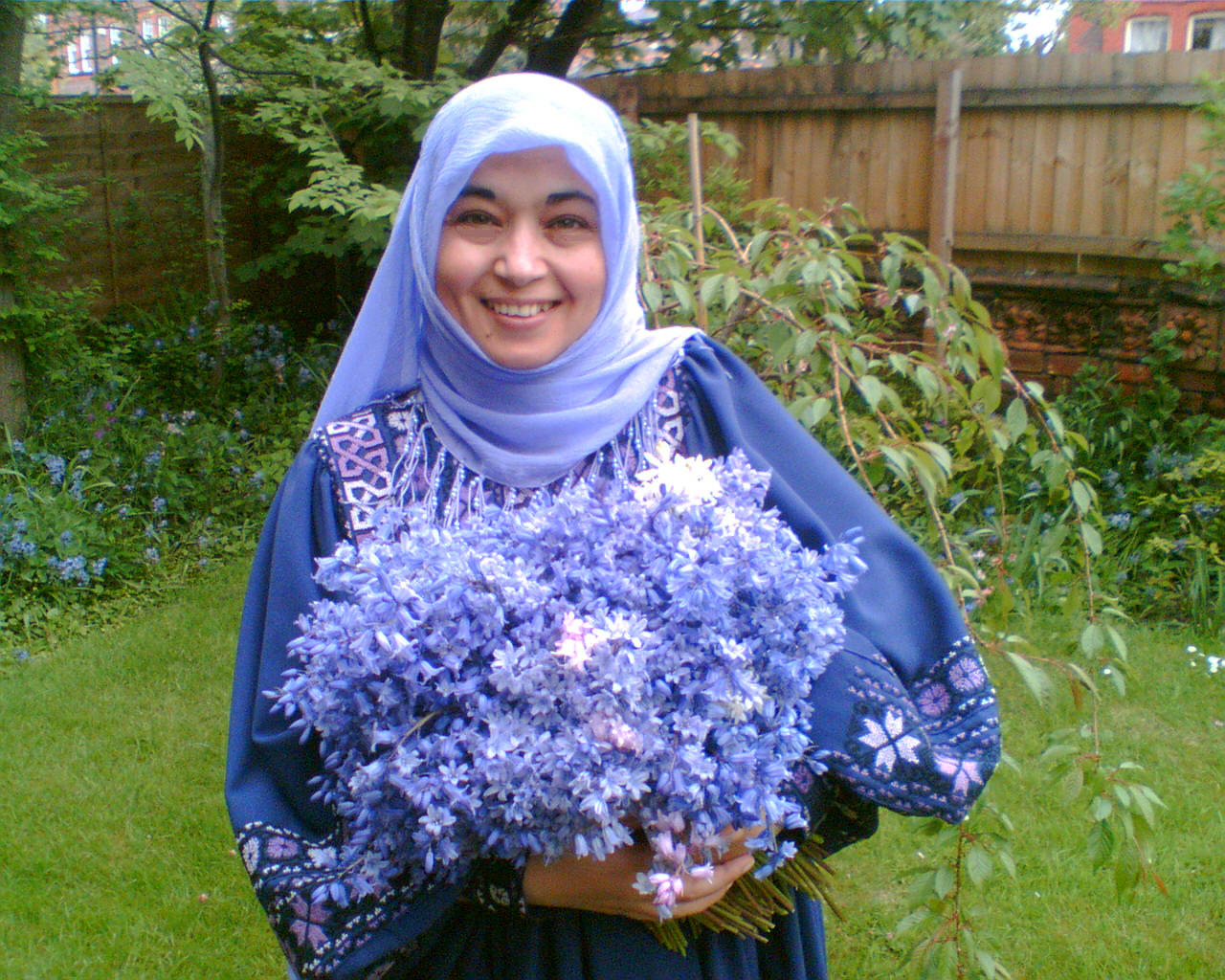
Look at me
by Nahida Izzat
Look at me
I would love to write poetry about love,
Paint rainbows and butterflies,
Smell the scent of pink rose buds,
And dance;
Dance with the melody of jubilant bluebirds
I would love to close my eyes and see children smiling
No guns pointing at their heads
Tell them stories of lily-like fairies in far-away lands
Not of bullets shrieking . . . of missiles exploding
But
How can I?
There is a dagger in my heart
I am hurting
Hurting
I bleed,
I cringe
I cry
HUMANITY, WHERE ARE YOU?
I am being slaughtered
Under your watchful eyes
I am cold . . . cold . . . cold
I cringe
I cry
Humanity, where are you?
Why do you turn your face away?
Why do you keep looking the other way?
I am here
Languishing
In Gaza's
alleyways
Humanity, where are you?
Look at me
See me
I am here
Sighing
In Gaza's
alleyways
I cringe
I cry
Humanity,
Enough turning the other way !
Turning a deaf ear
Turning a blind eye
While I,
and oh ! my poor children
Die
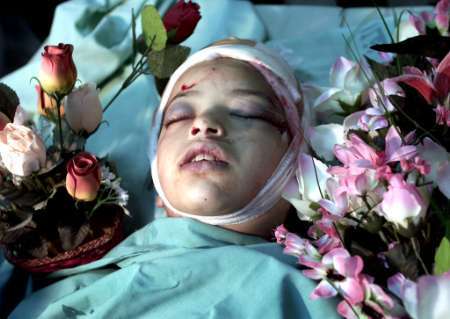
Walid Khazindar was born in 1950 in Gaza City.
He obtained a law degree in Beirut
in 1978. He is considered one of the best Palestinian poets; his poetry is
characterized by metaphoric originality and a novel thematic approach
unprecedented in Arabic poetry. He was awarded the first Palestine Prize for
Poetry in 1997. He lives in Tunis.
Distant light
Harsh and cold
autumn holds to it our naked trees:
If only you would free, at least, the sparrows
from the tips of your fingers
and release a smile, a small smile
from the imprisoned cry I see.
Sing! Can we sing
as if we were light, hand in hand
sheltered in shade, under a strong sun?
Will you remain, this way
stoking the fire, more beautiful than necessary, and
quiet?
Darkness intensifies
and the distant light is our only consolation —
that one, which from the beginning
has, little by little, been flickering
and is now about to go out.
Come to me. Closer and closer.
I don't want to know my hand from yours.
And let's beware of sleep, lest the snow smother us.
Translated by Khaled Mattawa from the author's collections
Ghuruf Ta'isha (Dar al-Fikr, Beirut, 1992) and Satwat al-Masa
(Dar Bissan, Beirut, 1996). Reprinted from Banipal No 6.
© Translation copyright Banipal and translator. All rights reserved.
And here is a poem by Dr. Hanan Ashrawi that gives us a child's
perspective on the Israeli occupation of Palestine:
Hadeel's Song
Some words are hard to pronounce—
He-li-cop-ter
is most vexing
(A-pa-che or Co-bra is impossible)
But how it can stand still in the sky
I cannot understand—
What holds it up
What bears its weight
(Not clouds, I know)
It sends a flashing light—so smooth—
It makes a deafening sound
The house shakes
(There are holes in the wall by my bed)
Flash-boom-light-sound—
And I have a hard time sleeping
(I felt ashamed when I wet my bed, but no one scolded me).
Plane—a word much easier to say—
It flies, tayyara,
My mother told me
A word must have a meaning
A name must have a meaning
Like mine,
(Hadeel, the cooing of the dove)
Tanks, though, make a different sound
They shudder when they shoot
Dabbabeh is a heavy word
As
heavy as its meaning.
Hadeel—the dove—she coos
Tayyara—she flies
Dabbabeh—she crawls
My Mother—she cries
And cries and cries
My Brother—Rami—he lies
DEAD
And lies and lies, his eyes
Closed.
Hit by a bullet in the head
(bullet is a female lead—rasasa—she kills,
my pencil is a male lead—rasas—he writes)
What’s the difference between a shell and a bullet?
(What’s five-hundred-milli-meter-
Or eight-hundred-milli-meter-shell?)
Numbers are more vexing than words—
I count to ten, then ten-and-one, ten-and-two
But what happens after ten-and-ten,
How should I know?
Rami, my brother, was one
Of hundreds killed—
They say thousands are hurt,
But which is more
A hundred or a thousand (miyyeh or alf)
I cannot tell—
So big—so large—so huge—
Too many, too much.
Palestine—Falasteen—I’m used to,
It’s not so hard to say,
It means we’re here—to stay—
Even though the place is hard
On kids and mothers too
For soldiers shoot
And airplanes shell
And tanks boom
And tear gas makes you cry
(Though I don’t think it’s tear gas that makes my mother cry)
I’d better go and hug her
Sit in her lap a while
Touch her face (my fingers wet)
Look in her eyes
Until I see myself again
A girl within her mother’s sight.
If words have meaning, Mama,
What is Is-ra-el?
What does a word mean
if it is mixed
with another—
If all soldiers, tanks, planes and guns are
Is-ra-el-i
What are they doing here
In a place I know
In a word I know—(Palestine)
In a life that I no longer know?
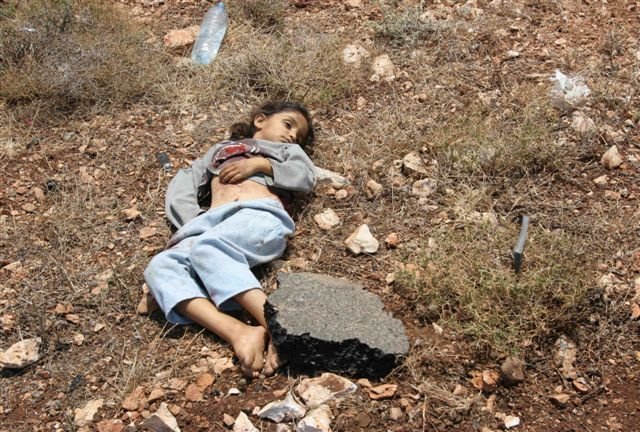
Excerpts from Under Siege
by
Mahmoud
Darwish
translated by Marjolijn De Jager
Here on the slopes of hills, facing the dusk and the
cannon of time
Close to the gardens of broken shadows,
We do what prisoners do,
And what the jobless do:
We cultivate hope.
A country preparing for dawn. We grow less intelligent
For we closely watch the hour of victory:
No night in our night lit up by the shelling
Our enemies are watchful and light the light for us
In the darkness of cellars.
Here there is no "I".
Here Adam remembers the dust of his clay.
You who stand in the doorway, come in,
Drink Arabic coffee with us
And you will sense that you are men like us
You who stand in the doorways of houses
Come out of our morningtimes,
We shall feel reassured to be
Men like you!
When the planes disappear, the white, white doves
Fly off and wash the cheeks of heaven
With unbound wings taking radiance back again, taking
possession
Of the ether and of play. Higher, higher still, the
white, white doves
Fly off. Ah, if only the sky
Were real [a man passing between two bombs said to me].
Cypresses behind the soldiers, minarets protecting
The sky from collapse. Behind the hedge of steel
Soldiers piss—under the watchful eye of a tank—
And the autumnal day ends its golden wandering in
A street as wide as a church after Sunday mass . . .
[To a killer] If you had contemplated the victim’s face
And thought it through, you would have remembered your
mother in the
Gas chamber, you would have been freed from the reason
for the rifle
And you would have changed your mind: this is not the
way
to find one’s identity again.
The siege is a waiting period
Waiting on the tilted ladder in the middle of the storm.
Alone, we are alone as far down as the sediment
Were it not for the visits of the rainbows.
We have brothers behind this expanse.
Excellent brothers. They love us. They watch us and
weep.
Then, in secret, they tell each other:
"Ah! if this siege had been declared . . . " They do not
finish their sentence:
"Don’t abandon us, don’t leave us."
Our losses: between two and eight martyrs each day.
And ten wounded.
And twenty homes.
And fifty olive trees . . .
Added to this the structural flaw that
Will arrive at the poem, the play, and the unfinished
canvas.
Oh watchmen! Are you not weary
Of lying in wait for the light in our salt
And of the incandescence of the rose in our wound
Are you not weary, oh watchmen?
A little of this absolute and blue infinity
Would be enough
To lighten the burden of these times
And to cleanse the mire of this place.
In the state of siege, time becomes space
Transfixed in its eternity
In the state of siege, space becomes time
That has missed its yesterday and its tomorrow.
The martyr encircles me every time I live a new day
And questions me: Where were you? Take every word
You have given me back to the dictionaries
And relieve the sleepers from the echo’s buzz.
The martyr enlightens me: beyond the expanse
I did not look
For the virgins of immortality for I love life
On earth, amid fig trees and pines,
But I cannot reach it, and then, too, I took aim at it
With my last possession: the blood in the body of azure.
The siege will last in order to convince us we must
choose an enslavement that does no harm, in fullest liberty!
Resisting means assuring oneself of the heart’s health,
The health of the testicles and of your tenacious
disease:
The disease of hope.
Greetings to the one who shares with me an attention to
The drunkenness of light, the light of the butterfly, in
the
Blackness of this tunnel!
Greetings to the one who shares my glass with me
In the denseness of a night outflanking the two spaces:
Greetings to my apparition.
My friends are always preparing a farewell feast for me,
A soothing grave in the shade of oak trees
A marble epitaph of time
And always I anticipate them at the funeral:
Who then has died . . . who?
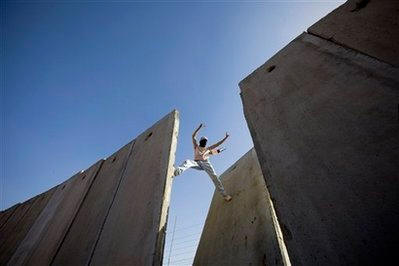
Ahmad Al-Za’tar
by
Mahmoud
Darwish
translated by Tania Nasir
For two hands, of stone and of thyme
I dedicate this song. For Ahmad, forgotten between two
butterflies
The clouds are gone and have left me homeless, and
The mountains have flung their mantles and concealed me
From the oozing old wound to the contours of the land
I descend, and
The year marked the separation of the sea from the
cities of ash, and
I was alone
Again alone
O alone? And Ahmad
Between two bullets was the exile of the sea
A camp grows and gives birth to fighters and to thyme
And an arm becomes strong in forgetfulness
Memory comes from trains that have left and
Platforms that are empty of welcome and of jasmine
In cars, in the landscape of the sea, in the intimate
nights of prison cells
In quick liaisons and in the search for truth was
The discovery of self
In every thing, Ahmad found his opposite
For twenty years he was asking
For twenty years he was wandering
For twenty years, and for moments only, his mother gave
him birth
In a vessel of banana leaves
And departed
He seeks an identity and is struck by the volcano
The clouds are gone and have left me homeless, and
The mountains have flung their mantles and concealed me
I am Ahmad the Arab, he said
I am the bullets, the oranges and the memory
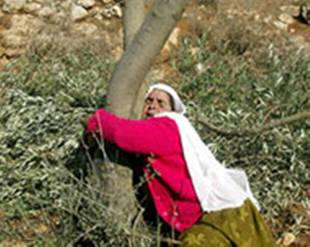
Stones that sprouted legs
by
Iqbal Tamimi
Written for the memory of my Iraqi colleague
Atwar Bahjat who was killed while reporting from Iraq.
The bed of defeat has always been feminine.
Ever since the sky was within reach
a woman fluffing a wombless vanilla pillow
has given birth to scandals.
The thorns took advantage,
climbing the shoulders of the bare peach,
stealing the bride
whose perfume never swirled in the wind.
The apple went mad,
glued in his grief
to the fingers of his land.
Stripping off his desire
He shouted, cried,
"I’ve perfected banging water drums
because my share of plight is
exactly like yours,
although my teardrops
could quench hatred’s fire."
We all perfected the game
attacking the features of things.
We dallied with the nails of our jailer
who bought the East
sometimes with prayers,
at other times
with a convoy of female slaves.
The knight of the mountains
has been collecting our wounds
to sprinkle them on a heap of dew.
He waited a long time
until the stones sprouted legs,
chasing the mud groom
who tested the virginity of the heavens,
bearing his imported season
on the shoulders of winter.
I screamed into his shirt,
"Rescue me please, from this cold body.
My circle has been defeated by armies of frost,
chased by eagles of dust.
Toss your body
against the ink lorry,
Drown your sorrow in a cup of coffee or . . .
die standing up like a wall:
defend the hymen of the thyme;
defend a wagon
ready to load the victims of
terror.
Fight for
honey-flavoured Poems,
document your defeat . . . if you
choose
on a sobbing poem.
For a lilac became a naked martyr
in becoming a trembling pavement for a camera crew."
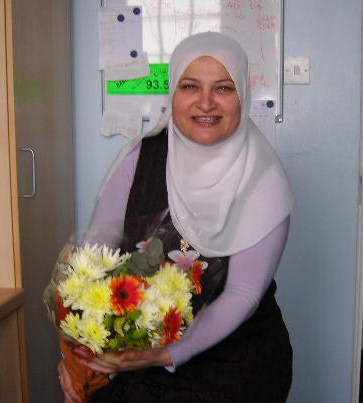
Palestinian poet Iqbal Tamimi (above)
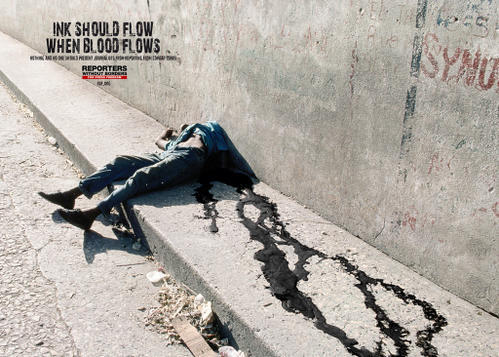
Murdered by my own ink
by
Iqbal Tamimi
The ports of my papers,
are fields of uncertainties.
I plant my anchor
to secure my old face
while it ages toward oblivion.
My dream is stretching
between a place
under the umbrella of the wind,
and
an illusion under the rain.
The distance
is . . . too far
to arrest the dead man,
who crucified me
in a hideous, unthinkable moment.
I am just a number within an army
of unlucky ones,
killed by the poison of their own ink,
and the stupidity of their own fingers,
slaughtered by despair.
Our traps
race us in our sleep,
to attend a wedding
between the rain and the desert.
Our pains . . . twitter
While we assassinate ourselves,
hoping some one;
not one of us
will rise
to write a better dirge
while watching the skittering feet of the poor
following their own footprints,
forgetting the phantoms behind,
to the side,
on some other route,
swarming with the dust of honor,
as we abandon our bevy
to increase our number
by . . . one.
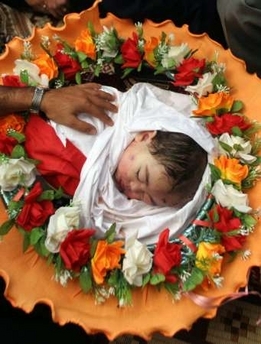
Armed with a prayer
by
Iqbal Tamimi
Once upon a crime,
the night
hijacked the face of my homeland.
The next day,
the spring was pronounced dead.
My blood
lost its way rivuletting through sand.
I was not courageous enough
to declare
the theft of my skin;
It was stretched by loathsome hands
to create a new face for an old drum.
There . . .
sat my anxiety
on the banks of pain,
washing my punctured voice,
asking me
how would I . . .
fish for my poem’s crumbs in a mine field?
What could I say?
For . . .
I had lost the dawn in the market,
my mouth was stuffed
with the sweat of my exile,
nothing of me remained
but
my few half-living fingers
exhuming the guts of lines,
a nose . . .
striving hard to find its way home,
and a pair of eyes,
that looked but could not see
any
of the absent loved ones,
who used to be there for me.
My pulse was swinging,
documenting my name,
alongside others hanging
on the verge of plight.
My loaf was naked.
I was armed only with a prayer.
A child beneath the rubble
Screamed, calling my name
Mama . . . Please . . .
tell them not to execute my kite.
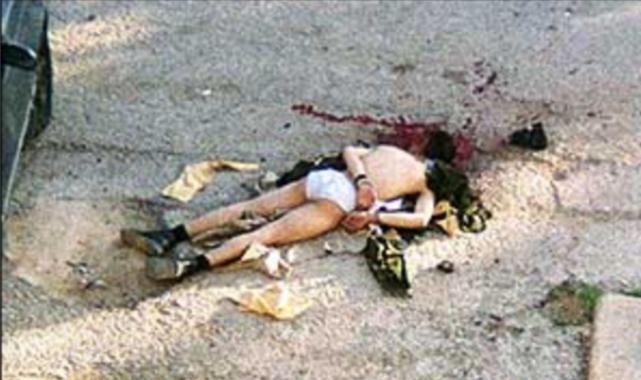
Hidden dimensions
by Nahida Izzat
My first son Hassan
Was born on April the 9th
You might think
So what … why are you saying it
With such a gloomy tune
What is wrong with the 9th of April?
You have to be a Palestinian
To understand
For on the 9th of April 1948
The massacre of Deir Yassin
Took place
Where every man women and child
Of that peaceful farming village
Was killed in cold blood
No one survived
Except those
Who pretended to be dead
As we celebrate the birth of a newborn
With joy
We mourn and grieve
Lost loved ones
In our midst
Nothing becomes insular
Nothing is disjointed
No single colours
The fabric of our lives
Makes the most amazing tapestry
If you hold it backwards
Looking at the wrong side
You’ll see a mirror image
Of shades of a blurred picture
With loops . . . knots and fraying thread
If you turn it over
It looks much neater
But still you can’t actually see
The full picture
Only colours and shadows
But hey . . . take a little time
And walk backwards
Further back
Look at the tapestry
From a distance
You will be amazed
At its outstanding beauty
All these murky shades
That didn’t make sense to you
Even disturbed you
When you were near
From afar
These dark shadows
Are precisely what makes this piece
So unique
So spectacular
These unfathomable hues
Are what give our life portrait
Its depth
And hidden dimensions
Since that day of 1948
Many . . . many babies were born
On April the 9th
Our joys are always stained
With hints of sorrow
Our sadness is always coloured
With hues of hope
Without which
The tapestry of our lives
Will never be complete
Won’t be as rich
Or as beautiful
Don’t waste much time
Staring at the wrong side with fury
Turn it over . . .walk further back . . . and feel the glory
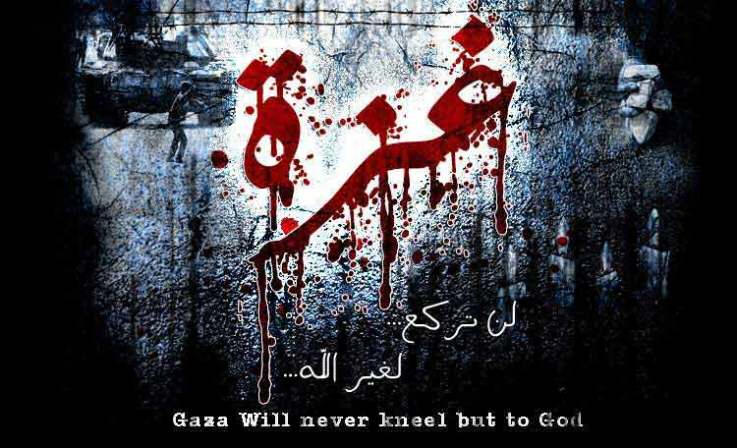
Apollyon I - Night of the Apocalypse
by Nakba
His eyes meet mine with blank incomprehension.
How did you come, my friend, to harm this child?
"She was not mine, and no report’s been filed.
So what, old chum?" (Strange lines beyond my scansion.)
A girl so sweet, if woebegone?
Why, surely she was everyone’s!
He lifts his eyes, shifts, sighs, spits, unbeguiled.
He does not know that I have come to judge him.
"What’s it to you?" he threatens, with a leer.
She was my child.
"That thing defiled?"
Ten trillion wavering stars blink, disappear.
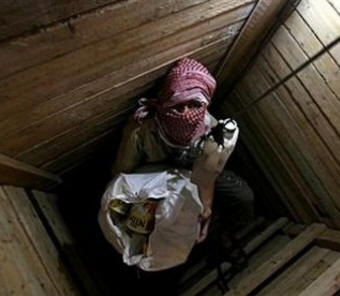
Her Slender Arm
by Nakba
Her slender arm, her slender arm,
I see it reaching out to me!—
wan, vulnerable, without a charm
or amulet to guard it. Flee!
I scream at her in wild distress.
She chides me with defiant eyes.
Where shall I go? They scream, "Confess!
Confess yourself, your children lice,
your husband mantis, all your kind
unfit to live!"
See, or be blind.
I cannot see beyond the gloom
that shrouds her in their terrible dungeon.
I only see the nightmare room,
the implements of torture.
Sudden
shocks contort her slender frame!
She screams, I scream, we scream in pain!
I sense the shadow-men, insane,
who gibber, drooling, Why are you
not just like US, the Chosen Few?
Suddenly she stares through me
and suddenly I understand:
I hear the awful litany
of names I voted for. My hand
lies firmly on the implement
they plan to use, next, on her children
who huddle in the corner. Bent,
their bidden pawn, I heil Amen!
to their least wish. I hone the blade
"Made in America," their slave.
She has no words, but only tears.
I turn and retch. I vomit bile.
I hear the shadow men’s cruel jeers.
I sense, I feel their knowing smile.
I paid for this. I built this place.
The little that she had, they took
at my expense. Now they erase
her family from life’s tattered book.
I cannot meet her eyes again.
I stand one with the shadow men.
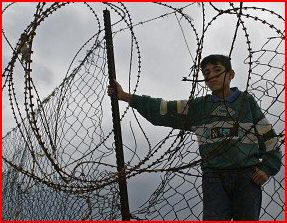
Suffer the Little Children
by Nakba
I saw the carnage . . .
saw girls' dreaming heads
blown to red atoms,
and their dreams with them . . .
saw babies liquefied
in burning beds
as, horrified,
I heard their murderers’ phlegm . . .
I saw my mother stitch
my shroud’s black hem,
for in that moment
I was one of them . . .
I saw our Father’s eyes
grow hard and bleak
to see frail roses severed at the stem . . .
How could I fail to speak?
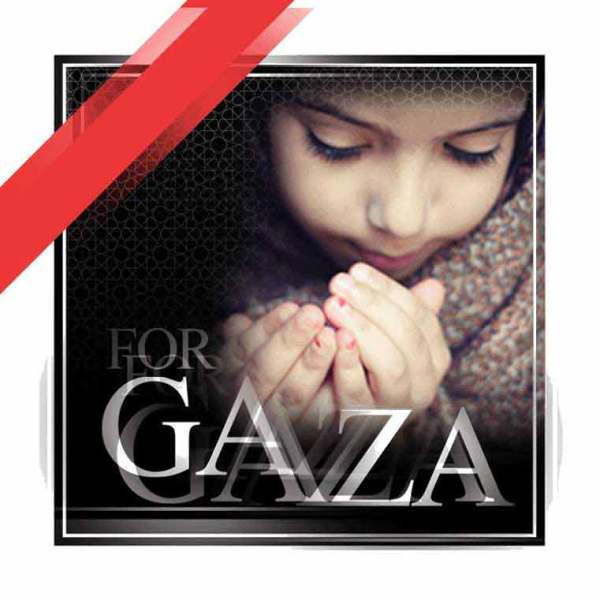
Lines for a Palestinian Mother and Child
by Nakba
I swear her eyes were gentle . . . that she was
a child herself, although she bore a child
close to her breast, her one and only cause.
I watched in apprehension as men filed
in close, goose-stepping ranks on either side,
as if they longed for blood, on Eastertide.
I thought of women slain for being born
the wrong race, sex, caste, or the wrong religion.
I thought of Joan of Arc, her tunic torn,
her breasts exposed, her bloody Inquisition.
I felt the flames and then her screams explode.
I thought of Mary and her dolorous road.
When will religion learn men must repent
of killing even one mild innocent—
both
before and after Lent?
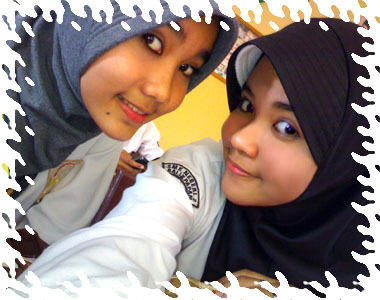
The Least of These
by Nakba
Here lies a child of the Holocaust.
Here all her bright dreams lie buried, unknown . . .
lie buried, unlived. And who knows the cost?
No roses grow here by this stone
stark as bone.
"Dearly Beloved," her white marker reads,
as many bright sermons on Love have begun,
but this is her end. She lies among weeds
more somber than widows’,
six feet from the sun.
Whom shall we cherish? O, whom shall we love?
The war profiteer, or the peaceable dove?
"Made in America," the Cruise Line is read:
now Palestine’s dove lies here—cold, shattered, dead.
Here lie her pieces. Friend, read them, and weep.
Scream blindly for justice, or blind, away creep!
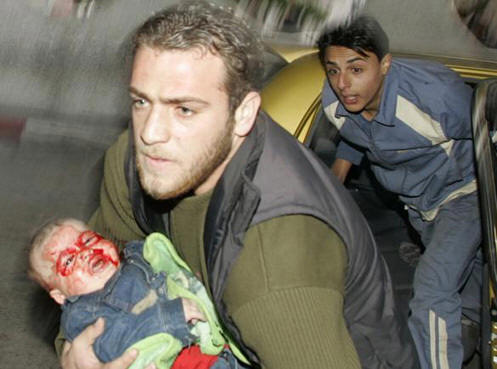
In her dread repose (I)
by Nakba
Find in her pallid, dread repose—
no hope, alas!, for the Rose.
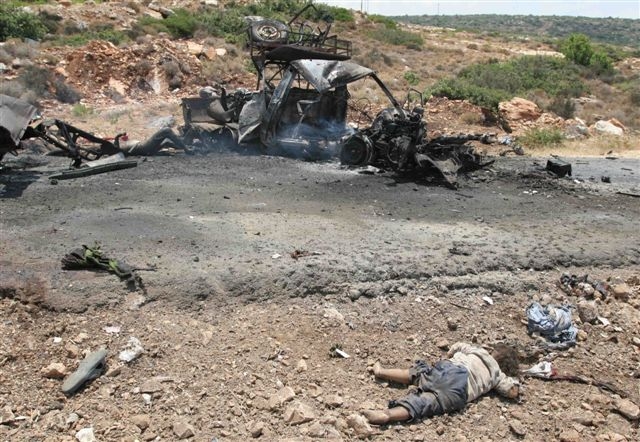
In her dread repose (II)
by
Nakba
Find in her pallid, dread repose—
no hope for the World. O, my violated Rose!
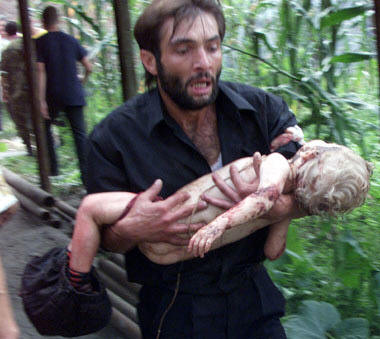
The Horror
by
Nakba
the Horror is a child who died because
we closed our eyes to simple Nature’s laws,
who knows no justice, but red fangs and claws
the Horror is the child we led to stray
into dark wilds where evil Men hold sway,
then abandoned her, and swiftly walked away
now she lies dead, and many innocents!
the Tiger prowls; He longs to kill; He pants
for blood; before Him, children die like ants
the Tiger rules by Law, red Claw and Tooth,
while Barnums laugh, count Beans, and sip Vermouth.
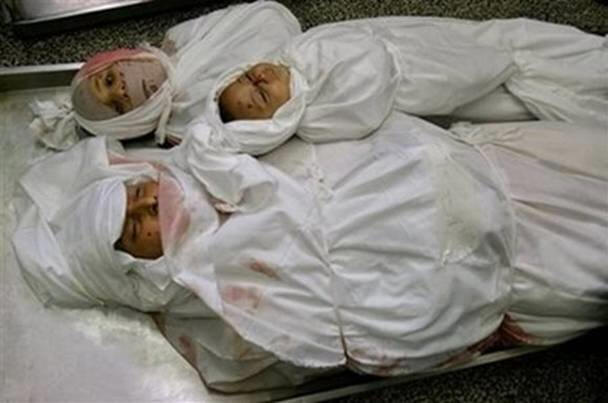
Lockheed, Take Heed
by
Nakba
Terror fell upon my children. Wailing,
they ran toward my arms—small, pale with fright.
They seemed eternities from me—so distant!
Their day exploded. Now I live in night.
"Made in America." I find that tragic.
Though far less tragic than my sweet doves, blown
to atoms by your profits’ ill-bought magic.
Land of the "brave," the "free"? Brave freedom’s flown
to heights unknown—too high to see my people
crushed in the dust by those you love so well.
Sing hymns. Praise God. Erect some higher steeple.
Condemn my kind to poverty, and hell.
"Shock and awe?" Yes, I feel awe—and shock.
You jackals killed my doves, my lambs, my flock!
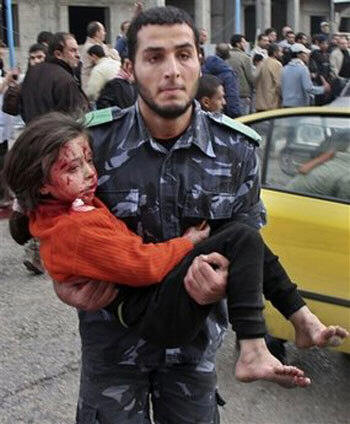
The BOSS
by Nakba
In 1948,
crying "Holocaust!"
the Jews became the keepers
and mad sweepers of the lost
Palestinian nation,
while every American "Christian"
wept with great elation
to see Yahweh’s "salvation."
He’s the BOSS!
Though He couldn’t take on Hitler,
though Himmler had Him harried,
though Goering had Him groping
for answers—yes, and worried—
though Mengele had mangled
the fairest and the brightest
of all His chosen tribes
and those with whom He’s tightest . . .
He’s the BOSS!
Forget all human justice.
Forget about two wrongs.
Just ply the LORD with money,
pleas, prayers and fervent songs.
Then let the children suffer
and let the strong run wild.
You’re in with heaven’s Duffer!
Your prayers have Him beguiled!
So ... You’re the BOSS!
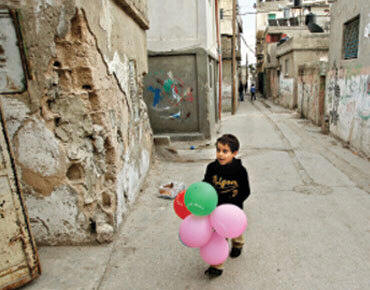
US Schoolboys
by Nakba
The simple path to peace
begins with a simple step,
as the sun breaks bright to the East
though the schoolboy has long overslept.
O, when will he rise and yawn!
Will he miss how dew spangles the lawn?
The simple path begins
when the schoolboy repents of his sins,
for his balmy vacation’s long over.
There’s no time to be lolling in clover!
Now that the day has begun,
he must rise in accord with the sun.
The path is called Justice . . . and now
he must walk it, and stoutly avow
to follow wherever it leads
till the sun sets blaze to the weeds . . .
he must thresh, so his brothers can find
peace’s path, though the world seems blind.
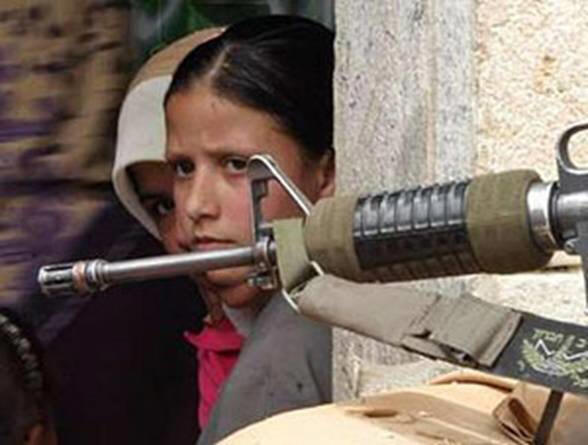
I Saw
by
Nakba
I saw the carnage . . .
saw their dreaming heads
blown to red atoms,
and their dreams with them.
I saw their fathers’ eyes
grow hard and bleak,
as did my own.
I heard their murderers’ phlegm.
I saw them in my dreams;
my knees grew weak . . .
for in that moment I was one of them . . .
How could I fail to speak?

Stampede
by
Nakba
I dreamt last night I was a Palestinian
herded like a cow or a defeated Indian
down some new Trail of Tears, into Gaza’s corral.
And I dreamt that you watched me
from the highest Wall.
I dreamt the whip cracked; how it bit my flesh!
I was gaunter than the skeletons of Bangladesh.
But I stood straight, upright. I refused to fall.
And I dreamt that you watched me
from the highest Wall.
I screamed aloud, but I refused to break
though my geysering blood created red lakes.
My oppressors laughed, Nazis!, but I stood tall.
And I dreamt that you watched me
from the highest Wall.
O, when will you see me, and meet my eye?
O, when will you hear me, and regard my cry?
You put me here. You helped build this cursed Wall
with your nickels and your dimes and your pious calls
for "democracy" and "freedom." How your voice appalls!
Now we all mill here like cattle, in our abattoir stalls.
It was you who interred us. Please, before it’s too late,
break down the fucking wall, fling open hell’s gate!
Amen
The HyperTexts



























